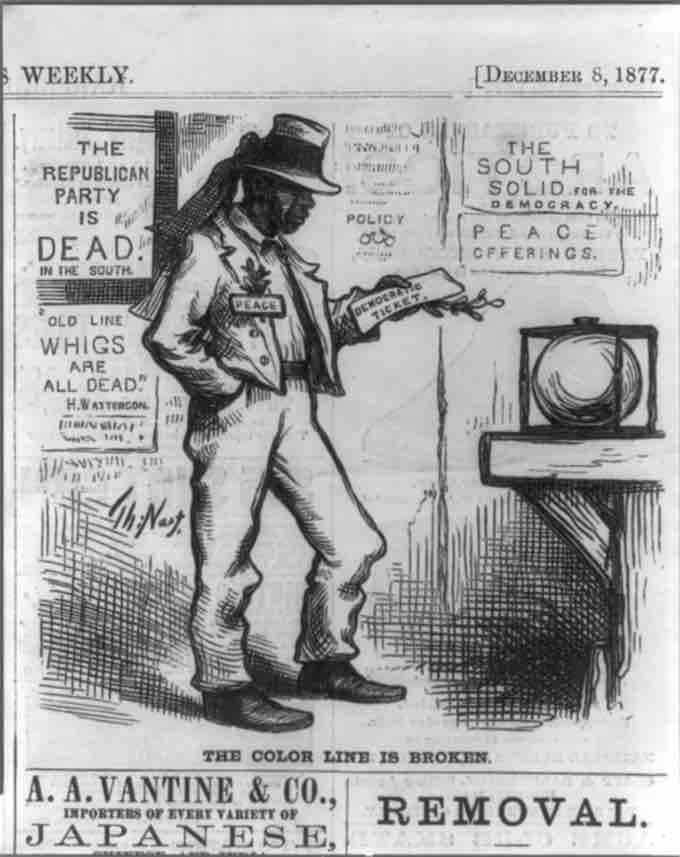Overview
In the South, political and racial tensions developed within the Republican Party as a response to attacks by the Democrats. In several states, the more conservative "scalawags" fought for control with the more radical "carpetbaggers," and the Republican Party steadily lost support. Meanwhile, freedmen were demanding a bigger share of the offices and patronage, squeezing out their carpetbagger allies. The racial tension within the Republican Party was exacerbated because poor whites resented the job competition from freedmen. Finally, some of the more prosperous freedmen were joining the Democrats, angered by the failure of the Republicans to help them acquire land. In response, the Democrats tried a strategy called the "New Departure."
New Departure and the Redeemers
The Grant administration had proven by its crackdown on the Ku Klux Klan that it would use as much federal power as necessary to suppress open anti-black violence. So, by 1870, the conservative Democratic leadership across the South decided it had to end its opposition to Reconstruction and black suffrage to survive. They decided it would be more successful to fight the Republican Party on economic grounds rather than on issues of race. This "New Departure" offered the chance for a clean slate without having to symbolically fight the Civil War every election. Furthermore, many wealthy Southern landowners thought they could control part of the newly enfranchised black electorate to their own advantage.
Democrats began asserting that they were just as loyal to the United States as the Republicans and now supported some civil rights. In the South, Democrats who embraced the "New Departure" called themselves "Redeemers." Democrats began pushing for economic modernization and recovery, alleging that the Republican-controlled state governments were inefficient and corrupt.
The Redeemers' program emphasized opposition to the Republican governments, which they considered to be a corrupt violation of true republican principles. They also worked to reestablish white supremacy. The crippling national economic problems and reliance on cotton meant that the South was struggling financially. Redeemers denounced taxes higher than what they had known before the war. At that time, however, the states had few functions, and planters maintained private institutions only. Redeemers wanted to reduce state debts. Once in power, they typically cut government spending, shortened legislative sessions, lowered politicians' salaries, scaled back public aid to railroads and corporations, and reduced support for the new systems of public education and some welfare institutions.
As Democrats took over state legislatures, they worked to change voter-registration rules to strip most blacks and many poor whites of their ability to vote. Blacks continued to vote in significant numbers well into the 1880s, with many winning local offices. Black congressmen continued to be elected, albeit in smaller numbers, until the 1890s. George Henry White, the last Southern black of the post-Reconstruction period to serve in Congress, retired in 1901, leaving Congress completely white.
In the lower South, violence continued and new insurgent groups arose. The disputed 1872 election of a Republican governor in Louisiana led to an outbreak of violence—later known as the "Colfax Massacre"—in which 3 white men died, 120–150 African Americans were killed, and some 50 African Americans were held as prisoners. This marked the beginning of heightened insurgency and attacks on Republican officeholders and freedmen in Deep South states.
The "New Departure" was strongly opposed by large factions of Democrats in the Deep South, who professed loyalty to the Confederate legacy. Republicans attacked the Democrats as being insincere about reform, and committed to states' rights at the expense of national unity and to white supremacy at the expense of civil rights.

This political cartoon from 1877 depicts the Democrats' control over the South. It shows a black man holding a Democrat voting ticket and wearing a badge that reads "Peace." Posters around the man read, "The Republican Party is dead in the South," "Old line Whigs are dead," and "The South solid for the democracy."